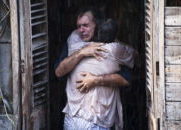
This somewhat depressing Cuban 0dd-couple tale takes part in a dilapidated Havana neighborhood where time has stood still and where both the fabric of the buildings and life in general struggle to survive. The rather dour-looking 50 year old Miguel (Patricio Wood) ekes out a living as a dishwasher at a cafe by day, and at night he is the carer for his bed-ridden roommate Diego (Jorge Martinez) who is dying from AIDS.
Judging by appearances of how they treat each it is quite a wonder home their childhood friendship has survived the test of time. Unlike heterosexual Miguel, Diego is gay and flamboyant and is determined to be as bright and cheerful in the circumstances. His good humor maybe be wasted on Miguel but their close neighbors in their shabby apartment building appreciate it.
The two man eke out a very basic existence and Miguel saves what little he can towards his eventual passage to the US. After his failed illegal attempt some years ago he has now applied for an official visa, and his days are now spent marking time off until he is allowed to leave Havana. However despite this, he dips into his savings to get the one birthday gift that Diego craves for, that of a ‘date’ with a young rent boy.
The ‘mulatto’ boy he pulls of the street is known as P4 (Cristian Jesús Pérez) which is a reference to how well he is endowed but in the end all Diego wants to do is take a quick look at his naked body, and then chat. The young hooker is very personable and the two hit it off, so much so, that much to Miguel’s annoyance he comes back for an unpaid visit to see how Diego is bearing up a few days later.
Into this odd cast of characters comes Diego’s 16 year-old mouthy pregnant niece Yusi (Gabriela Ramos) who demands to be able to stay in the apartment now that she has run away from home. This brash teenager has no filter at all , so she insists of haranguing her Uncle to make sure he leaves his room to her in his Will as she says he will be dying soon.
This intriguing but maudlin tale directed by Fernando Pérez chugs away until it’s very inevitable ending, and asides from the occasional somewhat obligatory statements of loyalty to the State, there is no real attempt to turn this into a ‘poor but happy’ story. The compelling part is not the drama itself but a whole series of eye-opening vignettes on the reality of contemporary life in Havana. Its the scenes like that in the manic Barber Shop or the shared taxi ride with strangers in the pouring rain, or simply Miguel waiting in line to get a bucket of water to bathe, that speaks volumes and are rather unforgettable.

